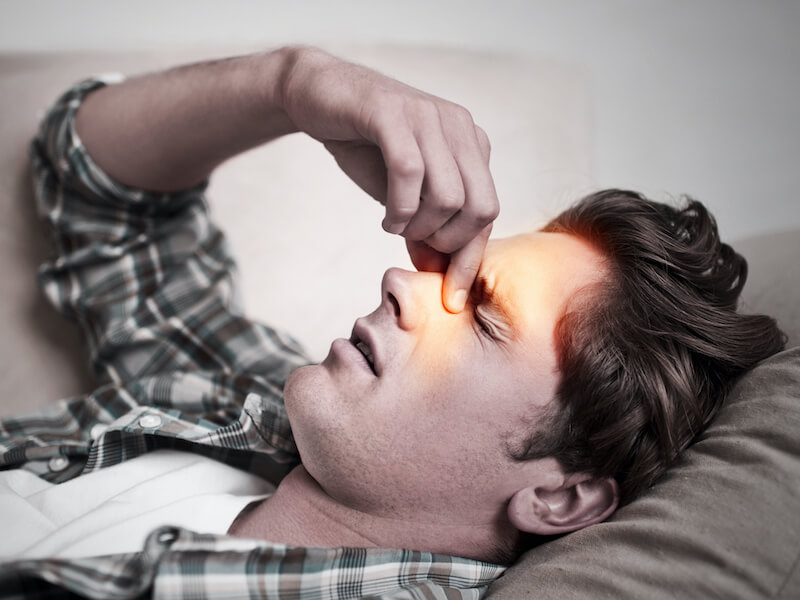
Most of us are familiar with the old cliche “it’s not the heat, it’s the humidity”. And it’s true. Humidity is oppressive and inescapable. Activities are less fun when you’re having a hard time breathing through the muggy air. And humidity can also be more than annoying, it can trigger a sinus infection.
How do you know if you have a sinus infection?
Sinusitis (a sinus infection) is a general type of disorder in many ways. They happen when fluid builds up in the air pockets behind your face (called sinuses, as you may have suspected). This fluid can then get infected, usually by viruses, but occasionally by bacteria as well. With that infection comes more symptoms (and more fluid)–and normally a fair amount of discomfort.
Here are a few symptoms to watch for:
- Sinus drainage that won’t stop.
- A chronic fever or high temperature.
- Tooth aches (sinus pressure can make your teeth hurt).
- Headaches (particularly those that feel like they’re brought on by “pressure”).
- Nasal blockage that won’t clear itself up. Most often, sinus infection-caused congestion will last for ten days or more.
Sinus infections will cause any combination of these symptoms. As a general rule, you should seek advice from your primary care physician if you have cold symptoms that don’t seem to recede or are particularly severe.
Can you actually get a sinus infection from humidity?
A wide range of underlying conditions can trigger a sinus infection. In some cases, a common cold can cause extra fluid to become entrenched, fluid that then gets infected and leads to a lengthy illness.
But it seems hard to believe that humidity could cause a sinus infection.
It isn’t! Very high humidity really can cause sinus infections. The reason for this is that your respiratory defense processes don’t work at full efficiency when the air is heavy and wet.
And for a little thing called cilia, that’s particularly true. Cilia are little hairs found all through the nose that move protective mucus around where it’s required. Cilia also help filter out harmful pathogens, dirt, dust, and other irritants. But when the air becomes extremely humid, your cilia stop working efficiently (I mean, let’s be honest, don’t we all). And repeated sinus infections can be the outcome.
And even though more germs get in, that’s not the only reason. Even something as simple as excess dust or more prolonged exposure to allergens can cause the kind of fluid buildup that leads to sinus infections.
What is too much humidity?
In order too work efficiently, your cilia and defensive mucus do need some humidity. Under normal conditions, this is not something you have to worry about. But when you notice dew points going into the 70s, it’s a good plan to take a little care.
Can humidity that causes infections be protected against?
You can minimize your risk of getting a humidity-driven sinus infection, but you can’t get rid of it. You can safeguard your hearing from infection by taking some measures to keep your sinuses healthier. Some of the most common include the following:
- Make use of nasal sprays to keep your cilia healthy and working: Dry cilia can be just as compromised as overly humid cilia. You can supply your sinuses with the perfect amount of moisture by using nasal sprays.
- Avoid allergens and irritants: When it’s humid, try to avoid things that aggravate your nose. For instance, when it’s very humid avoid a walk through the woods if you’re allergic to tree pollen. You should also avoid things like the barbecue at the neighbor’s house if smoke irritates your nose.
If you notice that you’re getting repeated sinus infections, including when it’s humid, then it may be a good idea to talk to us. Sometimes, the shape of your sinuses can make you more susceptible to infection. There are also certain medications that we can recommend to keep your sinuses healthy in other situations.
Start enjoying summer again
There’s so much to do and enjoy in the summer and that makes it a special time of year. You want to be out for a swim, on a hike, or at a sporting event not stuck inside nursing a sinus infection.
One possible factor that can lead to a sinus infection is humidity. If you’re particularly worried about sinus infections, schedule an appointment with us to talk about preventative steps you can take when the air gets a little extra sticky!